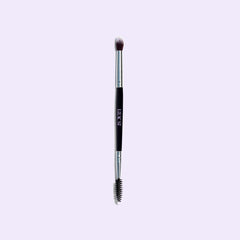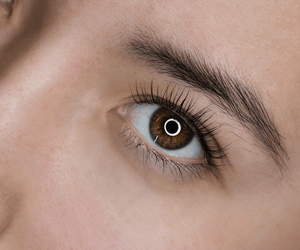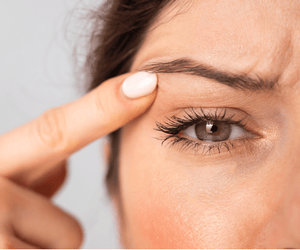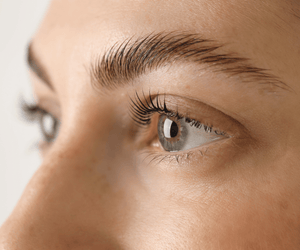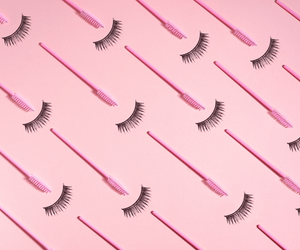Mascara wands come in many different shapes and sizes. Sometimes, the brush makes a major difference in the look of your lashes. Some formulators argue it plays a bigger role than the formula itself! At the same time, some wand design aspects are purely aesthetic, giving an impression of how mascara could affect your lashes. In this post, we’ll explain the different mascara brush types, what makes each unique, and how to choose the best one for your lashes and style.
Table of Contents
- Mascara Brush Types
- Mascara Wands for Your Lash Type
- Mascara Wands by Functionality
- Lilac Mascara Wand Types
- Bottom Line
Mascara Brush Types
There are a lot of different mascara brush types. They’re made of different materials with different shapes and bristle distribution patterns. Here’s what you should know about each one:
1. Nylon
Traditional mascara brushes are made of nylon, a flexible plastic that can form thin fibers. In mascara wands, those fibers are usually wrapped around a metal core in a very dense cone pattern. Because of the thin, dense bristles, nylon brushes pick up and dispense a lot of mascara to each lash, providing dramatic volume.
Pro tip: Use a tissue to wipe excess mascara off your nylon wand, especially when the mascara is still fresh. This will remove excess product to prevent spidery or clumpy lashes.
2. Molded Silicone or Plastic
Molded mascara wands are a modern innovation. While nylon brushes are more limited, molding allows producers to create custom mascara wands with specific shapes and bristle distribution patterns. They usually feature slightly thicker bristles that end in spikes, contributing to better lash separation for a more natural look.
3. Classic Straight Cone
The most common mascara brush type is the classic cone shape. The bristles are usually made of medium-length nylon fibers, occasionally with a slight taper to shorter bristles at the tip. You can’t go wrong with a cone wand, which always delivers balanced volume and length.
4. Thin With Short Bristles
For those seeking precision application and minimal mess, thin mascara brush types with shorter bristles are often ideal. With a thinner brush, it’s easier to avoid getting mascara smudges on your top lid, and you can adjust your application angle to fit into narrow spaces like the inner corner of the eye.
Thinner brushes may not create as much volume on the first coat, but multiple coats can still thicken the lashes significantly. They can provide just as much length as brushes with longer bristles, but using them lightly is also fantastic for enhancing the lower lashes.
5. Thick With Long Bristles
Thicker mascara brushes are often associated with thicker lashes. They usually have longer bristles, which result in a more thorough coating of each lash with mascara. These brushes can provide a lot of volume in one go, but they can be difficult to apply neatly.
Some mascaras have thick bases but short bristles, an unwieldy design that may lead to clumpy lashes.
6. Flexible
Flexible brushes are a newer innovation in molded brushes. Made with bendy components, these brushes don’t press roughly against the lashes as much, and instead bend to accommodate. There can be a bit of a learning curve when using them, but this approach can provide a lot of volume in a single stroke.
7. Dense Bristles
The more densely packed the bristles, the more volumizing a mascara will be. The densely packed bristles pick up a lot of mascara and deposit it onto the lashes very effectively. That said, denser bristles may not separate the lashes effectively from medium density.
8. Sparse Bristles
Sparse bristles are more common with molded mascara wands. The greater the space between the bristles, the more separating they will likely be, and the lighter each coat of mascara will be. This is great for a fanned-out look, although you may need to build up the lashes a little more than you would with a denser mascara wand.
If the bristles are too sparse, the mascara may not offer as much separation and may clump multiple lashes together.
9. Spike-Headed Brushes
Some mascara wands feature a spiky or ball-shaped tip, which is another fun innovation for reaching hard-to-reach spots. The ball shape makes it a little easier to capture oddly positioned lashes.
10. Curved Wands
Curved brushes are a great option if you find that straight cone wands are unwieldy. It makes it easy to cover the eyes' corners or catch lashes that grow in odd directions. Curved wands are often associated with curling mascaras, but we don’t think they necessarily offer a better curling effect than other wand shapes.
11. Hourglass
Hourglass mascara wands are all the rage these days, thanks to a series of ultra-popular mascaras that feature this shape. This type of wand is usually made of nylon bristles that are longer on the ends and shorter in the middle, creating an hourglass shape. The curve can make it easier to apply mascara, especially if you have
12, Multi-Bristle
Some brands have introduced mascara wands with multiple sides. Usually, one side will have longer, comb-like bristles, and the other will have shorter ones, so you can adjust for volume and separation as needed. Users may prefer one side to another when applying their mascara. Since these are usually molded mascara, they’re excellent for separating the lashes.
Mascara Wands for Your Lash Type
These are the factors to look for in your ideal mascara wand based on your lash type.
Short Lashes
If you have short lashes, the best mascara wands for you will help you keep your application neat while allowing you to elongate every lash. Look for wands with a thin or medium thickness. Consider the formula, as well - lengthening effects largely come from the mascara formula rather than the brush.

Long or Thick Lashes
With longer lashes, you’ll probably find that mascara brushes with longbristles coat your lashes better. If you want to avoid a heavy look, you might prefer a slightly more sparse molded brush.

Sparse Lashes
If your lash line lacks density, look for mascara wands designed to volumize with dense, long bristles. Ensure your brush also offers some separation to ensure each of your lashes is defined independently.

Curly Lashes
Choose a stiffer mascara brush to help comb and separate your curly lashes. Molded brushes will likely be easier to work with than nylon ones, and you might like comb-style designs.

Straight Lashes
When you have straight lashes, you’ll want a mascara that’ll help hold a curl. Oftentimes, brands suggest that curved or hourglass mascara wand shapes will offer a better curl, but we’re not convinced it’s true. Instead, look for slightly drier, waterproof formulas, as those tend to hold a curl better.

Lower Lashes
Choose a slim mascara wand with molded, short bristles for the lower lashes. This will make it possible to darken the lower lashes while keeping your look natural.

Mascara Wands by Functionality
If you’re looking for mascaras with specific features, from enhancing the length of your lashes to amping up volume, here’s how different wand functionalities come into play.
Volumizing
Volumizing wands have fluffy, dense, long bristles that can deposit a lot of mascara in one go. Brands often use thick, hourglass-shaped nylon wands for their volumizing mascaras.
Lengthening
A mascara's lengthening effect doesn't have much to do with the brush. It has more to do with the formulation of features like elongating polymers or fibers.
Curling
Curling mascaras often have a curved wand to “match” the desired effect. That said, the curling effect largely comes from the formula’s holding power rather than the brush.
Separating
A molded brush is queen when it comes to achieving fanned-out, separated lashes. Look for longer, medium-density bristles - you’ll often find comb wands that fit the bill.
Precision
Size matters when it comes to catching smaller lashes and achieving a very controlled level of definition. Look for slim, small brushes or brushes with tapered, rounded, or angled tips.
Lilac Mascara Wand Types
Mascara wands have a lot of uses beyond just, well, mascara application. We have a few unique lash products at Lilac St that feature a wand:
- Ciao for Now Lash Remover features a dual-sided comb brush. The shorter side is ideal for saturating the lash line with remover, while the longer bristles are perfect for removing excess lash adhesive.
- Lilac Lash Crystal Coat is designed to coat the lashes and extensions thoroughly with a sealing, shine-enhancing layer. The slim nylon wand distributes the Crystal Coat precisely and thoroughly.
- Dual-Sided Cleaning Brush has a classic nylon wand that thoroughly detangles your lashes, especially when you have lash extensions. The other side features a soft cleansing brush for washing your lashes and extensions safely.
- PRO Lash Glue has an incredibly thin micro-brush to allow for a controlled application of our lash adhesive, which can keep DIY lash extensions in place for over a week.

Bottom Line
There are many mascara wand types, but do the curves and swerves make a difference? In some cases, it does, especially if you’re looking for lush volume, eye-opening lash separation, or ease of use. When it comes to length or curl, it’s the key formula, but the brush shape can still give you a hint of what to expect. Play around with the different mascara brush types to see what shapes you like best!





